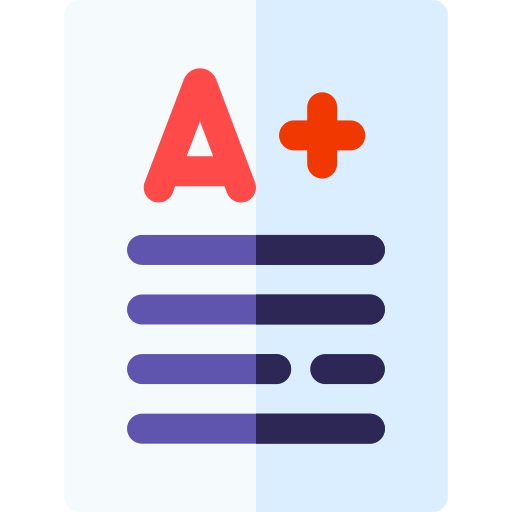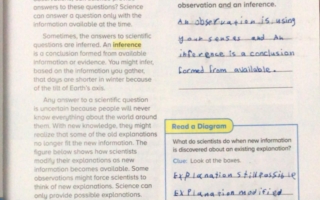If learning about your world begins with asking questions and making observations, can science provide answers to these questions? Science can answer a question only with the information available at the time.
Sometimes, the answers to scientific questions ore inferred. An inference is a conclusion formed from available information or evidence. You might infer, based on the information you gather, that days are shorter in winter because of the tilt of Earth's axis.
Any answer to a scientific question is uncertain because people will never know everything about the world around them. With new knowledge, they might realize that some of the old explanations no longer fit the new information. The figure below shows how scientists modify their explanations as new Information becomes available. Some observations might force scientists to think of new explanations. Science can only provide possible explanations.
Quick Check
1. Explain the difference between an observation and an inference.
An observation is using you senses and An inference is a conclusion formed from available.
Read a Diagram
What do scientists do when new information is discovered about an existing explanation?
Clue: Look at the boxes
Explanation Still possible Explanation Modified Explanation discarded New possible explanation
Modifying Explanations
Controlled Experiment
This student is adding different types of gas to each of the experimental test tubes. He will not add any gas to control test tube.
Read a Photo
What is the independent variable in this experiment?
Clue: Which factor was changed?
The variable that is changed in a controller experiment is called the independent Variable.
Variables
A controlled experiment allows scientists to determine a cause-and- effect relationship among the factors that are changed in the experiment. These factors are called variables. The variable that is changed in a controlled experiment is called the independent variable or manipulated variable. The variable that is being measured is called the dependent variable. The dependent variable might change as a result of the change in the independent variable. Scientists try to keep all other variables constant-or unchanged.
A controlled experiment must have two groups-a control group and an experimental group. The independent variable is changed in the experimental group and unchanged in the control group. Both groups include the same factors under the same conditions.
Look at the student's experiment in the above photo. He is performing a controlled experiment. He collected different types of gas in a balloon. He is adding the gases to separate test tubes to see if the pH of the cabbage juice in the test tubes changes. He will not add any gas to the control test tube. A control group allows scientists to determine whether changes observed during an experiment are a result of the changes in the dependent variable or changes in some other variable.
Quick Check
2. Which is the independent variable in an experiment investigating the effect of weight on the speed of vehicles?
Dependent variable
Scientific Theories
After a scientific explanation has been accepted by the scientific community, a scientific theory is formed. A scientific theory is an attempt to explain a pattern observed repeatedly in the natural world. Theories ore not guesses or someone's opinions, nor are theories vague ideas.
Theories in science are supported by observations and results from many Investigations. Theories are the best explanations that have been found so for. However, theories may change as new information becomes available. Albert Einstein discovered the theory of relativity. This theory has held true for many years. A large amount of evidence supports It.
Scientific Laws
A rule that describes a pattern in nature is called o scientific law. For an observation to be a scientific law, it must and an object in constant motion tends to be observed repeatedly. Then, the law stands until someone makes observations that do not follow the law A law, unlike a theory, does not attempt to explain why something happens, It simply describes a pattern. Sir Newton's laws of motion describe how objects move.
Quick Check
3. All objects exert gravitational force. Is this a scientific theory or a scientific law? Explain.
Scientific law A law, an like a theory does not attempt to explain why Something happens.
Each of Sir Newton's laws describe the motion of an object.





